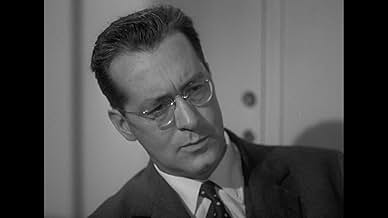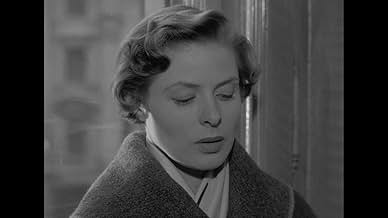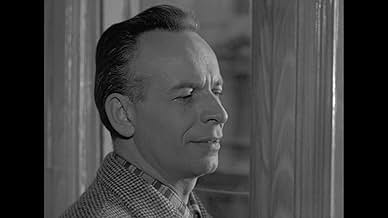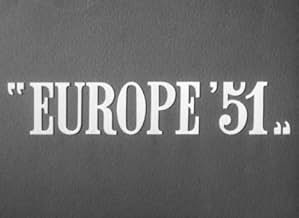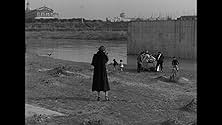IMDb RATING
7.4/10
5.2K
YOUR RATING
A wealthy woman becomes obsessed with humanitarianism when her young son dies after committing suicide.A wealthy woman becomes obsessed with humanitarianism when her young son dies after committing suicide.A wealthy woman becomes obsessed with humanitarianism when her young son dies after committing suicide.
- Awards
- 4 wins & 1 nomination total
Carlo Hintermann
- Extra
- (uncredited)
Antonio Pietrangeli
- Psichiatra
- (uncredited)
Rossana Rory
- Infermiera della casa di cura
- (uncredited)
Featured reviews
"Europa 51" may be the best of all the Bergman/Rosselini collaborations of the fifties,outshining such works as "Viaggio in Italia" or "Stromboli,terra de dio". There are two worlds in this god almighty universe:the one in which time is only a quiet river,and the one in which time is killing you.Irène (Bergman)belongs to the former one.Masina's character and Inès,the prostitute to the wrong side of town. When her son committed suicide,Irène was chatting,exchanging trivialities with her posh guests.Eaten with remorse,she realizes her taste for society life took the best of her and now it's too late!
One of her friends opens the gates of a then-unknown world for her:factories where men sweat ,streets where whores roam,slums where mothers strive to feed thir starving children.The man is a Marxist,and he tells Irene about a brand new world where justice and solidarity will be the golden rule.
However,Irene cannot subscribe to this ideology:"This world is not mine because it does not include Michel"-her late son".Beyond that point,the movie turns Christian;Marxist materialism cannot satisfy a desperate woman whose spiritual longing is intense.So she takes altruism to new limits,forgetting all about herself,becoming some kind of Mother Theresa.Christian,too Christian...Her family begins to think she 's lost her mind,and they locked her up in an insane asylum.
Is the ending optimistic or pessimistic?I would opt for the first epithet:behind her bars,Irène can see her new friends come and worship her as a saint.She's lost her wealth,but Michel's death was the beginning of an end for her.Through this redemption,she knows that now,this unfortunate boy forgave her
This is one of Bergman's unfairly forgotten performances.It is accessible and should appeal to a very large public.
One of her friends opens the gates of a then-unknown world for her:factories where men sweat ,streets where whores roam,slums where mothers strive to feed thir starving children.The man is a Marxist,and he tells Irene about a brand new world where justice and solidarity will be the golden rule.
However,Irene cannot subscribe to this ideology:"This world is not mine because it does not include Michel"-her late son".Beyond that point,the movie turns Christian;Marxist materialism cannot satisfy a desperate woman whose spiritual longing is intense.So she takes altruism to new limits,forgetting all about herself,becoming some kind of Mother Theresa.Christian,too Christian...Her family begins to think she 's lost her mind,and they locked her up in an insane asylum.
Is the ending optimistic or pessimistic?I would opt for the first epithet:behind her bars,Irène can see her new friends come and worship her as a saint.She's lost her wealth,but Michel's death was the beginning of an end for her.Through this redemption,she knows that now,this unfortunate boy forgave her
This is one of Bergman's unfairly forgotten performances.It is accessible and should appeal to a very large public.
It's a bit melodramatic, but up until Irene's final conversation with Cassatti the Commie, *Europa '51* is a very interesting film, first about a pampered rich woman's reaction to her son's death, then about the difference between windy Marxist propaganda and real compassion.
However, at that point, Rossellini's original idea takes over: He wanted to make a film about what would happen if a truly saintly person ever showed up in the modern world. And he had a very good idea of what would happen--or at least a very insistent one. The people here obviously behave the way they do solely to make the point Rossellini wants to make, even when their behavior doesn't seem very plausible. In defter hands, such manipulation can work. Here, though, you can see the tracks Rossellini has rather clumsily laid down to move the story where he wants it to go.
However, at that point, Rossellini's original idea takes over: He wanted to make a film about what would happen if a truly saintly person ever showed up in the modern world. And he had a very good idea of what would happen--or at least a very insistent one. The people here obviously behave the way they do solely to make the point Rossellini wants to make, even when their behavior doesn't seem very plausible. In defter hands, such manipulation can work. Here, though, you can see the tracks Rossellini has rather clumsily laid down to move the story where he wants it to go.
"Europa '51" is one of the most unique films I have seen and for that reason alone, it's well worth seeing.
The story begins oddly. A couple have a son they describe as 'unusually sensitive'. In reality, he clearly is mentally ill as he ends up killing himself even though he is a young boy. While very rare, such things do occur and not surprisingly it radically impacts on his parents. The father becomes more stoic and distant and the mother (Ingrid Bergman) begins to notice the plight of the poor and begins spending more and more time with them helping them with their problems. After a while, the wife is home less and less (possibly in response to her aloof husband) and he assumes she must be insane and acts accordingly.
The mother's reaction to grief and guilt about her son's death is the driving force in this film. But it's also interesting how doctors, priests and the police react to the lady's philanthropy. Overall, a tough film to describe but well acted and never dull.
By the way, the mother of six in the film (Giulietta Masina) was the real life wife of the famed Italian director, Fellini. Here she is quite good in this supporting role.
The story begins oddly. A couple have a son they describe as 'unusually sensitive'. In reality, he clearly is mentally ill as he ends up killing himself even though he is a young boy. While very rare, such things do occur and not surprisingly it radically impacts on his parents. The father becomes more stoic and distant and the mother (Ingrid Bergman) begins to notice the plight of the poor and begins spending more and more time with them helping them with their problems. After a while, the wife is home less and less (possibly in response to her aloof husband) and he assumes she must be insane and acts accordingly.
The mother's reaction to grief and guilt about her son's death is the driving force in this film. But it's also interesting how doctors, priests and the police react to the lady's philanthropy. Overall, a tough film to describe but well acted and never dull.
By the way, the mother of six in the film (Giulietta Masina) was the real life wife of the famed Italian director, Fellini. Here she is quite good in this supporting role.
Ingrid Bergman highlights in this compelling melodrama about a burgeois mother who becomes aware of the unfortunate social classes after the loss of a son. The film goes a step further and can also be read as the social portrait of the European status quo after the Great War. Some dialogs may appear evident and simplistic as far as ideology is concerned, but the impressive conclusion and the characteristic Rossellini's style makes it one of the most interesting films of his director and a valuable document about psychological war consequences which hasn't loose relevance.
I suppose that when "Europa '51" was going to be filmed there was a great professional mutual understanding between Rossellini (the director) and Ingrid Bergman (main actress). It's really astonishing the way Ingrid Bergman's face changes throughout the movie. She really looks like a "human God" (specially towards the end) just by looking at her expressions. If you have the opportunity of watching "Europa '51" twice, you will notice that her character in the beginning of the story, where Irene Girard (Ingrid Bergman) is the mother of a well-off family, is totally different from the last shots. I also like how Irene contrasts with the way of living of the poor children and working-women. Although Rossellini's movie is a bit lengthy, bearing in mind it was made in Italy in 1952, many events occur with short scenes perfectly connected obtaining a gorgeous dynamism as a whole. I'm almost sure that my favorite scene is the same as the majority of the people who watched "Europa '51". I refer to the moving ending of the story. I also like how the camera moves around capturing the contrast of expressions between the sick patients and Irene. I encourage everybody to watch this masterpiece, even twice!
Did you know
- TriviaThe square Irene and Andrea drive to is the Campidoglio in Rome. The equestrian statue is of Marcus Aurelius, emperor and stoic philosopher.
- GoofsWhen Michele falls down the stairs, his parents rush to the car to get him to the hospital. When his mother finds him, she is wearing the white gown she wore at the dinner. When they first arrive at the hospital, she has a fur coat on. A few hours later, suddenly she has changed into a grey suit.
- Quotes
Irene Girard: It is just that the love we feel for those closest to us, for those who should be and maybe really are dearest to us, suddenly isn't enough. It seems too selfish, too narrow. So, that we feel the need to share it, to make our love bigger until it embraces everyone.
- Alternate versionsIngrid Bergman, Alexander Knox and the other English-speaking actors dub their own voices into English for the English version.
- ConnectionsEdited into L'ombre qui pensait plus vite que son homme (1991)
- SoundtracksBésame Mucho
Written by Consuelo Velázquez
- How long is Europe '51?Powered by Alexa
Details
Box office
- Gross worldwide
- $9,381
- Runtime
- 1h 58m(118 min)
- Color
- Aspect ratio
- 1.37 : 1
Contribute to this page
Suggest an edit or add missing content

